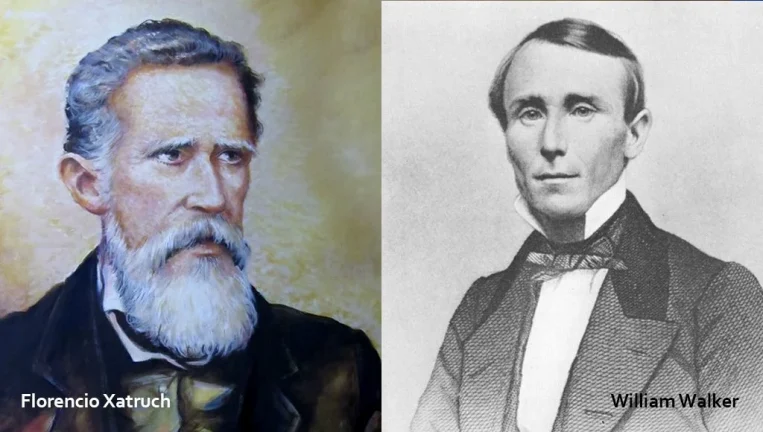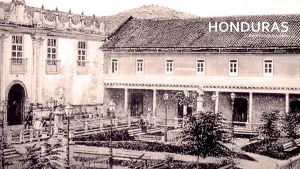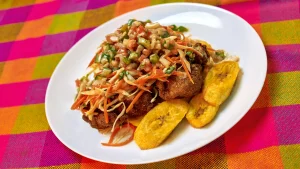William Walker a filibuster in Honduras
William Walker (Nashville, Tennessee, United States, May 8, 1824 – Trujillo, Honduras, September 12, 1860) was an American physician, lawyer, journalist, and politician. He is the most recognized of the so-called filibusters of the nineteenth century.
In Mexico he tried to conquer the territories of Sonora and Baja California, which led him to found a republic that ended in failure.
In 1855, together with a group of recruits known as Los Inmortales , he went to Nicaragua, a country that was immersed in a civil war, and fought alongside the democratic side, which sought to overthrow the legitimist president Fruto Chamorro Pérez. However, as he advanced in his military campaigns, he managed to assume power through rigged elections, in which he was elected as president of the nation.

Since 1824 the war between the Nicaraguan liberals and conservatives did not stop. In 1856 the Liberals, feeling hounded, signed a contract to bring in mercenary riflemen from the United States. «Free booters» they were called (literally, free boots), but around here they were called filibusters.
William Walker, journalist and colonel, lawyer and skilled writer, was convinced that the means to save the slave society that existed in the South of the United States was to conquer new territories outside that nation and impose slavery on them.
At the head of his filibustering phalanx, Walker helped the Liberals defeat the Conservatives, then immediately dispensed with the Liberals and proclaimed himself President of Nicaragua. For Walker, the mestizo peoples of these republics were worthy of slavery and so he decreed it.
Biography of Florencio Xatruch, the general who defeated William Walker
Walker’s adventure was not considered a contravention of the Clayton-Bulwer treaty because it did not have official backing, and even the US government reduced him to the status of a bandit when Walker made the unforgivable mistake of seizing the properties of the Company in Nicaragua. Transit.
Biografía de Florencio Xatruch, el general que venció a William Walker
This alienated him from Vanderbilt and from the powerful capitalism of the North of the United States.
During his stay in New Orleans in April 1860, Walker learned of the transfer of the Bay Islands from the United Kingdom to Honduras. He also learned of the discontent of the English settlers on the islands with the transaction and proposed to help them.
His plan was to try to associate with José Trinidad Cabañas, who was trying to resume power in Honduras. If he succeeded, he could control this country, organize an army and then defeat the armies of Nicaragua and Costa Rica. As a first step he organized a trip to the islands to study the terrain and plan a revolt, so he chose the island of Cozumel as an eventual base.
On June 5, 1860, a troop of a hundred men set out from the United States from Mobile on the schooner John E. Taylor . Another supply ship, the Clifton , sailed from New Orleans. However, the British, who were aware of the plans, intercepted the Clifton in Belize and subsequently recommended that the Honduran government delay the transfer of the islands, to hinder the intentions of the filibusters.
Finally, the Americans met in Roatán on July 27. Walker, besieged by British ships, decided to attack the fortress located in the port of Trujillo. However, residents were alerted to the movements.
On the night of August 5, 1860, ninety-one filibusters arrived at a distant bay 3 km from Trujillo. At dawn on August 6, Walker and Colonel Thomas Henry led the capture of the fort, which was successful, with no casualties. Once there, he declared the city a free port, with the purpose of damaging the Honduran economy by interrupting the collection of tariffs, but the maneuver was useless, since all the taxes collected in this place would be transferred to the British to pay an old debt. He attempted to contact José Trinidad Cabañas through Thomas Henry, but this emissary got into a brawl before reporting on his return and died two weeks later without disclosing any news.
On August 19, the British ship Icarus , led by Colonel Norvell Salmon, arrived near Trujillo and from there a note was sent to Walker demanding his surrender, with the guarantee that he would do so before the British authorities, since the presence of the filibusters hindered the return of the Bay Islands. After an exchange of notes, the filibuster, with 65 other men, fled to look for Cabañas.
On the way, they were persecuted and harassed by the Honduran troops. Arriving near Rio Tinto, the gang was reduced to 31 men, including Walker wounded and suffering from fever, finally being sighted by Salmon on September 3. The officer again demanded the surrender of the filibuster, who agreed when he was assured that he was doing it before the British authorities and not the Honduran ones. When asked about his person, he claimed to be the president of Nicaragua.
Once in Trujillo, he was informed that he would be handed over to the Honduran government, a decision that surprised and outraged him. He ended up locked in the town fortress, where he awaited instructions from Tegucigalpa that would decide his fate. The resolution, taken by José Santos Guardiola, was the death sentence. One of his officers, surnamed Rudler, received a four-year prison sentence, although he would later be pardoned. The rest of the inmates were sent to the United States.
At 8 a.m. on September 12, 1860, William Walker was brought before a firing squad near Trujillo. He was flanked by two priests and walked amid the jeers of the locals. According to a testimony:
He always showed the greatest cold blood, he did not even change color when he walked from the prison to the square where he was executed.
A battalion of soldiers executed the order. After two bursts and a coup de grâce he fell dead. His body was buried according to Catholic rites. Meanwhile, in the United States, Salmon was criticized for his deceitful behavior and the subsequent execution of the filibuster, after promising protection on behalf of the British government. However, Walker’s death was met with indifference by public opinion in the country.
Sources
- Biography of William Walker on Wikipedia.org ( http://es.wikipedia.org/wiki/William_Walker )
- The Filibusters ( http://www.angelfire.com/ca5/mas/hist/his502.html )



